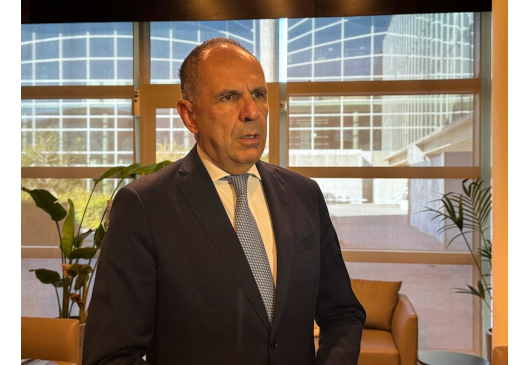 We concluded our visit to Jordan today, a country that is particularly crucial not only for the broader regional developments but also for the security architecture in our region, the Eastern Mediterranean. I would like to point out that we held meetings at the highest level with the King of the country, as well as with the Foreign Minister. We had the opportunity to reaffirm the excellent level of cooperation between the two countries. But we focused primarily on the situation in the Middle East and the unfolding humanitarian crisis. Our discussion focused on Greece's contribution to resolving the problem, as well as on the coordination of our actions.
We concluded our visit to Jordan today, a country that is particularly crucial not only for the broader regional developments but also for the security architecture in our region, the Eastern Mediterranean. I would like to point out that we held meetings at the highest level with the King of the country, as well as with the Foreign Minister. We had the opportunity to reaffirm the excellent level of cooperation between the two countries. But we focused primarily on the situation in the Middle East and the unfolding humanitarian crisis. Our discussion focused on Greece's contribution to resolving the problem, as well as on the coordination of our actions.
Greece, as a strong member of the European Union, is part of the larger Eastern Mediterranean region and is able to talk to the stakeholders. Greece is one of the few countries that have this ability precisely because it has acquired diplomatic capital due to its principled foreign policy. We are able to make a creative and substantial contribution to the Middle East issue. We agreed that the next steps should be coordinated by Greece and Jordan, together with other countries in the Arab world, which are currently at the forefront of the debate.
On the one hand, it is vital to extend and consolidate the routes for humanitarian aid corridors so that people in need, notably in the Gaza Strip, can have access to necessary supplies, as well as to reconstruct the fundamental infrastructure that has been damaged. On the other hand, it is crucial to begin the discussion on the solution on the basis of a longer pause, which will allow the parties, but also the international actors, to discuss a viable, lasting solution that will ensure sustainable peace and prosperity in the region.
JOURNALIST: However, Minister, the messages we are currently receiving from Gaza, southern Lebanon, and Iraq are not positive. At the very least, they do not point toward de-escalation. You are also traveling to Cairo today, and the Foreign Affairs Council will convene on Monday, with Egypt, Saudi Arabia, and Jordan in attendance. What do you expect from these next steps?
G. GERAPETRITIS: The truth is that we need to focus all our efforts on being able to prevent a crisis spillover to other regions that are by definition particularly vulnerable, such as Lebanon and the Red Sea, where we are already going through a growing tension in maritime security.
As you correctly mentioned, the Foreign Ministers of the key Arab countries are invited to the European Union's Foreign Affairs Council next Monday so that we can look at the roadmap together, develop humanitarian corridors in coordination with the European Union, and have a constructive discussion regarding these issues. In order to bring peace to the region. We should not miss another day. Greece, at the forefront of this situation, is holding talks with both the Palestinian Authority and Israel so that we can get out of this tug-of-war as soon as possible and restore peace and prosperity to the region.
Indeed, we will travel soon to Cairo. We will have contacts at the highest level with the President and the Foreign Minister. We understand that Egypt is a particularly important country in the Middle East issue. This is not solely due to its geographical proximity and its special relationship as a strategic ally of Greece and the European Union. Egypt can also have a direct channel of communication and play a crucial role. Our coordination with all of the main players in the region, both in the Arab world and in the European Union, I believe, is especially important to achieve a meaningful result in the shortest possible time.
January 16, 2024


